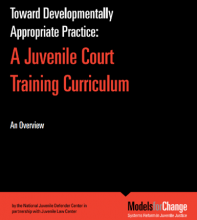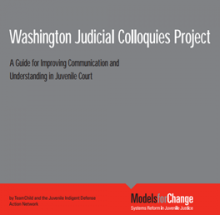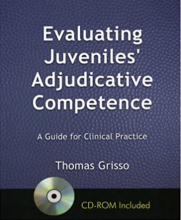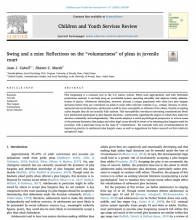Plea Bargaining
Guilty Pleas and Plea Bargains with Youth
It is estimated that 95 percent of convictions in adult and juvenile courts are the result of guilty pleas (sometimes called admissions in juvenile court), rather than convictions at trial. The decision about accepting a plea bargain or proceeding to trial therefore becomes one of the most significant decisions a defendant will make. Further, it is complicated topic to explore as part of a competency assessment.
Legal Backgrounds and Requirements
The criminal justice system evolved to incorporate plea bargaining during the late 19th and early 20th century as the number of criminal statutes grew—giving prosecutors more discretion to select from different statutes with meaningfully different sentences—and the justice system became busier (e.g., during Prohibition when courts saw an increase in cases). Thus, by the time the Supreme Court of the United States officially sanctioned plea bargaining in 1970, approximately 90% of cases were already being resolved in this manner.
A relatively small number of Supreme Court cases have defined the modern practice of guilty pleas and plea bargaining. Read more about decisions by the US Supreme Court.
-
Boykin v. Alabama, 395 U.S. 238 (1969)
-
Edward Boykin, Jr. was arrested and charged with five counts of robbery in Alabama. He was appointed an attorney, and at his arraignment pleaded guilty to all five charges. The record reflected that the judge did not ask any questions concerning his decision to enter a guilty plea or his understanding of the rights he was waiving. He was ultimately sentenced to death.
Mr. Boykin appealed his case to the Alabama Supreme Court and thereafter the Supreme Court. The Supreme Court addressed the “voluntary character of [Mr. Boykin’s] plea” (p. 241) and held: “It was error, plain on the face of the record, for the trial judge to accept [the defendant’s] guilty plea without an affirmative showing that it was intelligent and voluntary.” The Court stated that, much like confessions, guilty pleas must be voluntarily made, and defendants must have a basic understanding of the rights they waive as part of a guilty plea (e.g., the right against self-incrimination, the right to trial by jury, the right to confront one’s accusers).
-
Brady v. United States, 397 U.S. 742 (1970)
-
Robert Brady was charged with kidnapping in federal court. Although he originally pleaded not guilty, he later changed his plea to guilty after learning that his codefendant had confessed and planned to testify against him at trial. On appeal, he argued that his plea was coerced because he faced a maximum penalty of death if he was convicted at trial, but only faced a maximum of life in prison if he pleaded guilty (i.e., he was coerced into pleading guilty to avoid the death penalty).
Mr. Brady appealed his case through the United States District Court for the District of New Mexico and the Court of Appeals for the Tenth Circuit, and ultimately to the Supreme Court. The Court held that Mr. Brady’s guilty plea was voluntary and intelligent despite the fact that his decision was influenced by facing a more severe penalty at trial. The Court stated that the factors that influenced Brady’s decision to plead guilty were no different—or more problematic than—cases in which defendants plead guilty due to “accumulation of evidence” and the desire to avoid “the agony and expense” of trial (p. 750). The Brady decision reiterated that government actors cannot threaten or otherwise “overbear[] the will of the defendant” to enter a plea bargain, but held that avoiding a more severe penalty at trial was not evidence of coercion.
-
Padilla v. Kentucky, 559 U.S. 356; 130 S.Ct. 1473 (2010)
-
Jose Padilla was charged with multiple drug offenses (i.e., trafficking in marijuana, possession of marijuana, possession of drug paraphernalia) and operating a tractor/trailer without a weight and distance tax number in Kentucky. Mr. Padilla was born in Honduras, but by the time the Supreme Court heard his case, he had been a lawful permanent resident of the United States for over 40 years. He eventually pleaded guilty to the drug charges in exchange for the prosecution dismissing the final charge. As a result of his conviction, he faced deportation. However, evidence indicated that Mr. Padilla’s attorney failed to advise him of this consequence and informed him that he “did not have to worry about immigration status since he had been in the country so long” (p. 1478).
Mr. Padilla appealed his case to the Supreme Court of Kentucky and the Supreme Court of the United States based on the argument that his attorney’s failure to notify him about the risk of deportation violated his Sixth Amendment right to counsel. The Supreme Court held that defense attorneys must advise their clients whether their plea carries a risk of deportation. In its holding, the Court reaffirmed the distinction between “direct consequences” of a conviction—such as deportation—about which attorneys do need to advise their clients, and “collateral consequences” of convictions (i.e., indirect effects of convictions, such as consequences for employment or housing) about which attorneys do not need to advise their clients.
-
Missouri v. Frye, 566 U.S. 134; 132 S.Ct. 1399 (2012)
-
Galin Frye was charged with driving with a revoked license in Missouri. Because he had three prior convictions for driving with a revoked license, he was charged with a felony that carried a maximum penalty of four years in prison. After proceedings began against Mr. Frye, the prosecutor sent Mr. Frye’s attorney a letter outlining two plea bargains and included an expiration date. Defense counsel never informed Mr. Frye about the offers and both expired. Mr. Frye later pleaded guilty and was sentenced to three years in prison.
On appeal, Mr. Frye argued that he was denied effective assistance of counsel because counsel never communicated the prosecution’s plea bargains. The Supreme Court agreed, holding that defense counsel must communicate formal plea offers to their clients. In its decision, the Court reflected on the prevalence of plea bargains and considered the responsibilities of defense attorneys in that context:
“The reality is that plea bargains have become so central to the administration of the criminal justice system that defense counsel have responsibilities in the plea bargain process, responsibilities that must be met to render the adequate assistance of counsel that the Sixth Amendment requires in the criminal process at critical stages” (p. 1407).
- Lafler v. Cooper, 566 U.S. 156; 132 S.Ct. 1376 (2012)
-
Blaine Lafler was charged with assault with intent to murder and related offenses in Michigan. Although the prosecution offered a plea bargain on two occasions, Mr. Lafler rejected the offers based on defense counsel’s advice that the prosecution would not be able to meet their burden of proof at trial. At trial, Mr. Lafler was convicted and sentenced to 185 to 360 months in prison.
Mr. Lafler appealed his case through the Michigan courts, and later petitioned for federal habeas relief through the federal district court and the United States Court of Appeals for the Sixth Circuit. He argued that because his attorney’s advice was based on “an incorrect legal rule,” he had been deprived of his Sixth Amendment right to counsel. The Supreme Court held that when defense counsel provide deficient advice leading a defendant to reject a plea bargain, a defendant is denied the effective assistance of counsel guaranteed under the Sixth Amendment. The Court explained that the appropriate test in these cases is: whether, absent the ineffective counsel, a defendant would have accepted a plea offer less severe than his eventual sentence, and that the trial court would likely have accepted the plea.
Navigating Guilty Pleas and Plea Bargains with Youth: Research-Based Recommendations
The research on guilty pleas/plea bargaining has expanded dramatically in the last decade out of a growing recognition that nearly all defendants resolve their cases through guilty pleas. This research, in combination with the established literature on youths’ trial competence and understanding of other legal rights, and the growing literature on adolescent development and developmental immaturity, point to a number of relevant considerations for youths navigating guilty pleas and plea bargains.
Youths often have impairments in legal knowledge
Youths (and adults) in the justice system often have lower reading levels and higher rates of learning disabilities compared to their peers
Youths' developmental immaturity can influence their understanding of the plea process and their legal decision-making
For more information, please contact Janet I. Warren, DSW, Professor of Psychiatry and Neurobehavioral Sciences, Institute of Psychiatry and Public Policy, University of Virginia, [email protected], or 434-924–8305.





